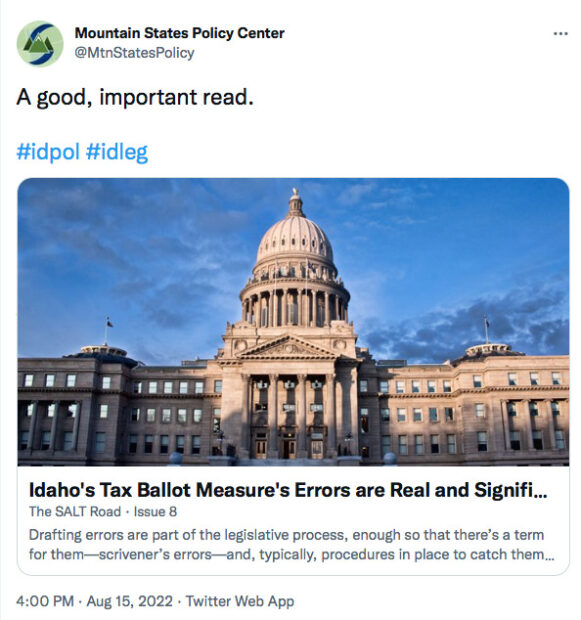(UPDATED 16:52, with a clarification and additional comments about the Quality Education Act.)
There’s a new think tank in town.
The Mountain States Policy Center advertises itself as a nonpartisan research group. Its goal is to promote the free market, individual liberty and limited government in Washington, Montana, Wyoming and Idaho.
Chris Cargill is the group’s incoming executive director. He has worked in television news and spent the last 13 years with the Washington Policy Center, a similar free-market think tank headquartered in Seattle.
Ken Dey, former business reporter at the Idaho Statesman, is the board chair of the group – a parallel to fellow think tank the Idaho Freedom Foundation. Its president, Wayne Hoffman, is also a former Statesman reporter.
The group wants to provide “research and recommendations to lawmakers, the media and the public, based on facts,” according to Dey’s Linkedin post, announcing his position on the board. Dey added that the organization will avoid politics and divisive rhetoric, something Cargill confirmed with EdNews.
Cargill said the group does not intend to compete with any other think tanks or policy organizations, but wants to inform policymakers and improve the quality of life in its four-state region.
Mountain States is a nonprofit, and will be funded “by citizens, businesses, event contributions and grants,” according to the group’s website.
The organization officially announced its start in a Tuesday news release, and will have two official launch parties — one in Boise on Oct. 5, and one in Coeur d’Alene on Oct. 6.
Education is one of the group’s top concerns
Mountain States will focus on research in several policy areas, including education.
The organization focuses on the free market, which Cargill defines as “the people.”
“We believe that before any government solution is tried … we ought to give the people the opportunity to try to fix a challenge or a problem,” he said. “The free market is basically allowing the citizens to … use their entrepreneurial spirit to solve problems, through innovation through technology, through ideas.”
The group’s top education priority is school choice.
“We believe that parents should have the right to use the dollars that they put into the public school system to educate their children as best as they see fit,” Cargill told EdNews.
The group supports providing parents with “more tools” to choose how and where to educate their children. The group has previously tweeted about charter schools and education savings accounts as examples of these tools.
ESAs would allow families to use public dollars to pay for private school tuition or other learning materials. The House Education Committee shot down an ESA earlier this year, largely over concerns of constitutionality. Idaho has a Blaine Amendment, which prohibits public funds from being used to support religious entities, including parochial schools. School choice advocates say they believe recent U.S. Supreme Court rulings have weakened states’ Blaine amendments.
Most of the state’s public education organizations oppose ESAs, arguing that they would drain public schools of funding.
Mountain States also appears to oppose the Quality Education Act, the Reclaim Idaho proposition intended to use increased income taxes to generate $323 million per year for K-12. Cargill says the group has not taken an official stance on the initiative.
Mountain States believes the initiative would reverse a set of 2022 tax cuts, inadvertently increasing taxes on all Idahoans and raising the price tag to $573 million. This claim was originally confirmed by the Idaho attorney general’s office, but may be unfounded, according to Betsy Russell of the Idaho Press. The group believes Russell’s article is inaccurate.


“We have concerns and don’t think it’s the best policy, but we don’t take an official position,” said Cargill in an email to EdNews.
One of the group’s first studies will focus on the initiative.
Mountain States also focuses on cross-state comparisons, mostly with Washington, Montana, Wyoming, and occasionally California and Oregon. The group intends to compare Idaho’s education system − and its funding and success indicators – with surrounding states.
